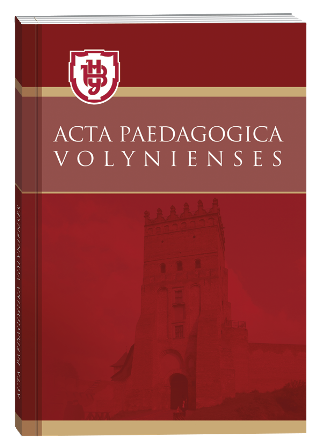LINGUISTIC AND PHILOSOPHICAL INTERPRETATION OF LANGUAGE UNITS IN THE PROFESSIONAL TRAINING OF PRIMARY SCHOOL TEACHERS
DOI:
https://doi.org/10.32782/apv/2025.2.14Keywords:
language units, linguistic competence, philosophy of language, professional training, future primary school teacher, pedagogical linguisticsAbstract
The article examines the linguistic and philosophical interpretation of language units in the context of the professional training of future primary school teachers. The author emphasizes the importance of developing linguistic competence in students of pedagogical education as a key component of a modern teacher’s professional expertise. The study focuses on theoretical approaches to defining the language unit and its role in speech activity, as well as the philosophical dimension of language as a form of thinking, cognition, and reality construction. The essence of the concept of "linguistic competence" is analyzed as the ability to deeply understand the language system, its functions, and structural elements. It is emphasized that future primary school teachers must not only possess basic knowledge of linguistics but also be capable of interpreting linguistic phenomena in terms of their semantic and philosophical meaning, and effectively applying this knowledge in teaching practice with young learners. Special attention is paid to the philosophy of language as an area that deepens the understanding of the interconnection between language, thought, and culture. The inclusion of philosophical approaches in language education is shown to contribute to the development of critical thinking, the ability to reflect, and the interpretation of linguistic phenomena within a broader context of cultural and professional communication. The article also outlines key methodological approaches to teaching linguistic content in the course «Theoretical Foundations of the Primary Ukrainian Language Curriculum». These approaches are based on the integration of structural-functional and philosophical-linguistic analyses. Such an integrated approach enables future teachers to acquire not only knowledge about language as a system but also to develop linguistic intuition, pedagogical reflection, and readiness for the creative application of linguistic knowledge in their professional practice.
References
Бахмат Н.В., Войцеховська С.А. Лінгводидактична компетентність майбутнього вчителя початкових класів: зміст і шляхи формування. Педагогічні науки: теорія, історія, інноваційні технології. 2020. № 2 (96). С. 35–44.
Державний стандарт початкової освіти. Затверджено постановою Кабінету Міністрів України від 21 лютого 2018 р. № 87. URL: https://zakon.rada.gov.ua/laws/show/87-2018-п (дата звернення: 14.04.2025).
Мартіна О.В., Третяк Н.В. Організація комунікативно-мовленнєвої діяльності як оптимізація розвитку культури мовлення молодших школярів. Сучасні технології початкової освіти: реалії та перспективи : зб. наук. праць / Кам’янець-Подільський національний університет імені Івана Огієнка. Київ: Міленіум, 2021. Вип. 4. С. 209–213.
Пасічник С.І. Філософія мови як підґрунтя формування мовної особистості. Філологічні трактати. 2018. Т. 10, № 3. С. 41–45.
Шевченко Л.С. Теоретико-методологічні основи філософії мови. Проблеми філософії. 2019. № 4. С. 98–104.







